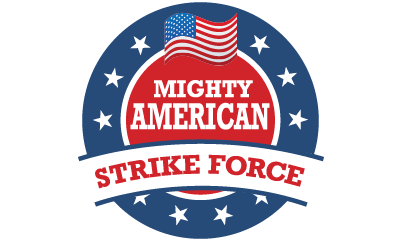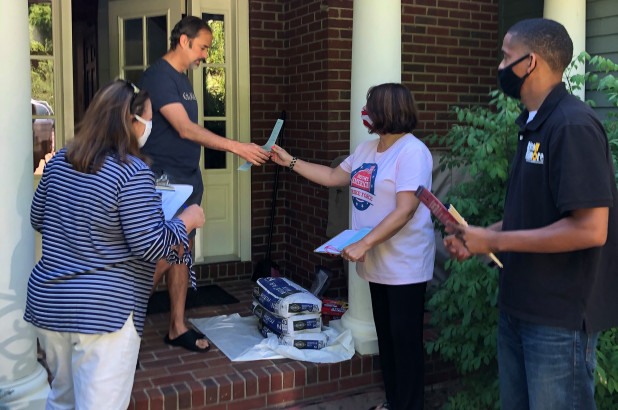On Nov. 9, 2016, Rick Potter was driving to the airport, having spent the last two weeks in Western Pennsylvania campaigning for Donald Trump, when his phone rang.
Jerry Morgan, a longtime Republican grassroots strategist, was on the line.
“Potter, I’m glad I caught you,” he said. “I’ve been up all night long, analyzing the results from Pennsylvania. We won by less than 1 percent — 40,000 votes. I’m absolutely convinced if the Mighty American Strike Force had not been here for the past 15 days Trump would not have carried Pennsylvania.
Potter was shocked.
“I was pretty overwhelmed,” said Potter, a 65-year-old commercial real-estate broker and developer based in Austin, Texas. “You know you do hard work, you hope it pays off, but you are never sure. Those numbers really showed we made a difference.”
In 2000, Potter started out as a volunteer for the Mighty American Strike Force, a conservative get-out-the-vote operation, and became the group’s national chairman in 2016. Now he and his band of volunteers are once again heading out to Pennsylvania and other key battleground states, where they will encourage voters to reelect Trump in 2020.
Trump was the first Republican to take the Keystone State since 1988, with many ballots coming from less-populated counties such as Washington, Westmoreland, Beaver, Luzerne, Butler and Northampton, where voters turned out in higher numbers for the billionaire than GOP nominees of the past.
Potter and his crew campaigned in all of those counties, knocking on doors, manning phone banks and making a personal connection with locals. When Mike DeVanney, a Republican communication specialist from Pittsburgh, first met Potter and his group in 2004, he said he didn’t know what to make of them.
“We weren’t sure how people would react to a guy knocking on your door, sometimes with a cowboy hat, definitely with cowboy boots, with an accent that didn’t sound like a Western Pennsylvania accent,” DeVanney said. “Turned out they were actually very impressed that people were so passionate about the election they traveled such a far distance to try to make a difference. Two weeks of work, vacation time, staying in not-the-best hotels and working endless hours, all to impact an electoral result.”
Initially formed by Texas conservatives in 2000 to help get their then-Gov. George W. Bush elected president, the group was first known as The Mighty Texas Strike Force.
They first came to Pennsylvania and other battleground states in 2004, when John Kerry took the state in favor of incumbent President Bush.
“We fell short that year and in 2012,” said Potter of their return to the state for Mitt Romney vs. Barack Obama. “When we came back in 2016 we were determined to not fall short again.”
Today they are known as the Mighty American Strike Force and their ranks have grown to more than 3,000, with volunteers based in safe red states like Alabama and Mississippi and impossible-to-win blue states like California and New York. All will get on planes, trains and automobiles to spread out across the country for the final weeks ahead of the Nov. 3 election.
“When we came back in 2016 we were determined to not fall short again.” – Rick Potter
“In 2016 we had 1,500 volunteers,” Potter said. “We now have teams in 42 different states, plus DC and Puerto Rico.”
To recruit volunteers, Potter said they speak to all types of conservative groups and “reach out to different coalitions like the faith-based communities, along with Asian Americans, black Americans and Hispanics, as well as veterans and law enforcement.”
And they already have boots on the ground. On Wednesday, members of the Strike Force were meeting with voters in Sewickley, Pa., an upper-middle-class suburb of Pittsburgh. Once a traditional Republican suburb, Sewickley is now considered vulnerable for Trump.
As of mid-August, Biden has the backing of 49 percent of registered voters (compared to Trump’s 48 percent) in 15 battleground states — including Pennsylvania, Ohio, Wisconsin and even Texas, according to a new CNN poll.
“We also now consider Texas a battleground this year,” admitted Potter. The last time Texas gave a Democrat its electoral votes was in 1976 when fellow southerner Jimmy Carter, then a Georgia governor, won 51.14 percent of the popular vote.
The latest RealClearPolitics averages show Trump leading Democrat Joe Biden by a slim 3.5 percentage points in the Lone Star State. Just one week before the 2016 election, polls forecast Trump with a similar 3-point narrow lead, but he went on to win Texas by a healthy 9 percent.
Potter said he isn’t taking any chances.
“We want to make sure that we completely win Texas,” he said. “We have a Senate race and some critical House races going on here, and we think it’s possible that we could flip three or more House races just in Texas.”
Two years ago, Potter’s team beat the drum for Sen. Ted Cruz when Democrat Rep. Beto O’Rourke shot to fame, raising millions of dollars with polls showing a very close race. It was, but Cruz beat O’Rourke by 2 percentage points.
And after Democratic Rep. Katie Hill resigned from the 25th District outside Los Angeles in the wake of “throuple-gate,” the Mighty American Strike Force deployed their troops to her seat. They helped Navy veteran Mike Garcia win the Special Election — the first time in 20 years a Republican flipped a Democratic House seat in California.
Democrats also have their own door-to-door armies, including labor unions, LGBT groups, women’s-rights groups, Moms Demand Action and Order of the Phoenix, to name a few.
But Potter believes his group is different.
“There is something that sets our volunteers apart from other volunteers and that is their personal passion,” he said. “They are willing to pay their own way to travel to these states, pay for their own hotels, and get up at the crack of dawn to make the calls and knock the doors sometimes for 18 hours of every day for 15 days. That kind of commitment shines through when they talk to people they are trying to persuade.”
Potter is set to arrive in Pittsburgh “at least two Fridays before the election” and sees his work more like a conversation than a mission.
“When you are able to meet people where they are and talk about why their vote for the president and the country is so important, it makes a difference.”

